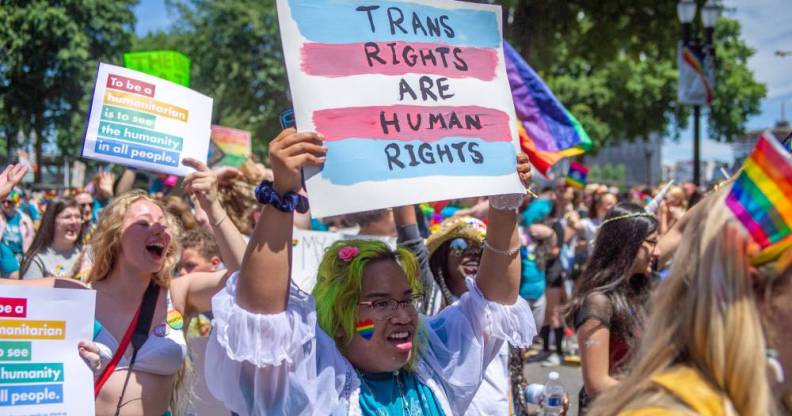Large majority of Scots think people should be ‘free to express their trans identity’

A person displays a sign reading “Trans Rights are Human Rights” during the Portland Pride Parade and Festival on 16 June 2019, in Portland, OR. (Photo by Diego Diaz/Icon Sportswire via Getty Images)
A slim majority of Scots think that trans people should be required to “obtain a doctor’s approval” before “having their gender legally recognised as different to their biological sex”, according to a new poll.
The survey was carried out by Survation on behalf of MurrayBlackburnMackenzie, a group co-founded by three female academics who have in the past complained of being “censored” and “silenced” after they were “falsely accused of being transphobic”.
Between 18 and 21 November 2021, two questions were asked of a representative sample of 1,028 Scottish adults: Should people need a doctors approval before “having their gender legally recognised as different to their biological sex” and should trans people be able to “freely express their transgender identity”.
The first question saw 53 per cent of respondents answer that their view is that trans people should be required to get a doctor’s approval before being allowed to change their legal gender. Twenty-seven per cent thought that trans people should not need a doctor’s approval, while 20 per cent said they don’t know.
The second question reveals more about MurrayBlackburnMackenzie’s intentions, again referring to gender assigned at birth as “biological sex” and describing trans people as those who may have “sex change surgery”. Both these terms are outdated, inaccurate and sometimes are considered offensive, particularly if not used by a trans person, according to the Trans Journalists Association.
In response, 64 per cent of Scots said they agreed that people “should be able to freely express their transgender identity”, including “to dress and to present themselves how they choose”. Seventeen per cent said they neither agreed nor disagreed, with 13 per cent disagreeing and six per cent saying they don’t know.
Responding to the findings, Lucy Hunter Blackburn of MurrayBlackburnMackenzie told Holyrood: “An unhelpful and polarising aspect of the discussion about Gender Recognition Act reform has been the positioning of support for retaining medical approval for individuals seeking a Gender Recognition Certificate as ‘anti-trans’. Our poll shows quite clearly that that simply isn’t the case.
“A majority of people in Scotland, across a broad range of characteristics, and often by a large majority, positively agree that people should be able to freely express their transgender identity. Relatively few actively disagree. This generally supportive attitude just doesn’t equate to support for removing all medical involvement for a change of legal status.”
A policy paper by MurrayBlackburnMackenzie in 2019 called “Losing Sight of Women’s Rights: The Unregulated Introduction of Gender Self-Identification as a Case Study of Policy Capture in Scotland” argued that the Equality Act does not protect trans people’s right to use gendered spaces in line with their gender.
This paper was rebutted by another group of academics, including trans people, who said that MurrayBlackburnMackenzie had made “erroneous statements” about “legal definitions of sex and gender, and about discrimination in law”.
On its website, MurrayBlackburnMackenzie is endorsed by Joanna Cherry MP, the “gender critical” former SNP frontbencher who was sacked amid a row about transphobia within the party, and Scottish Labour’s Jenny Marra and Johann Lamont – two former MSPs who once invited a transphobic academic who calls trans women “parasites” to speak in Holyrood on Transgender Day of Remembrance.

